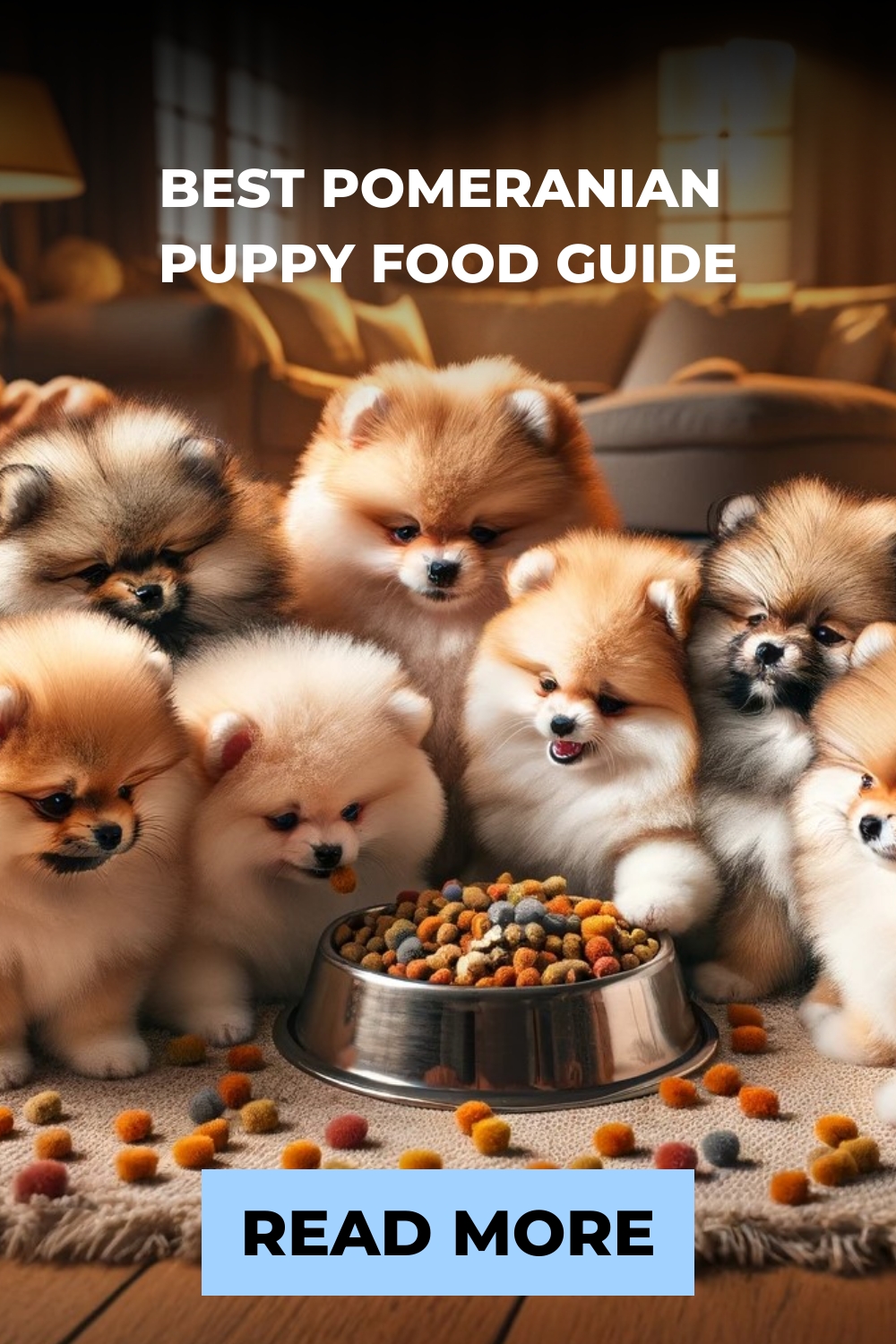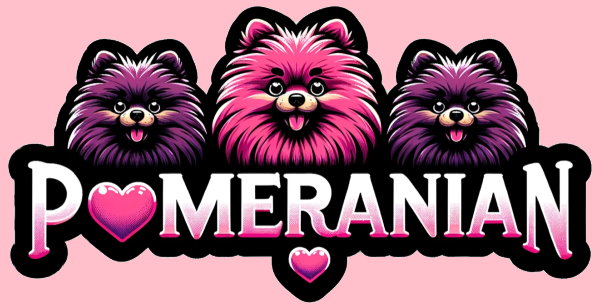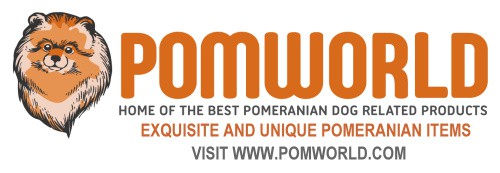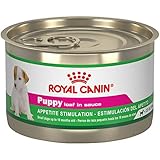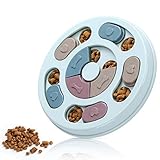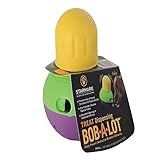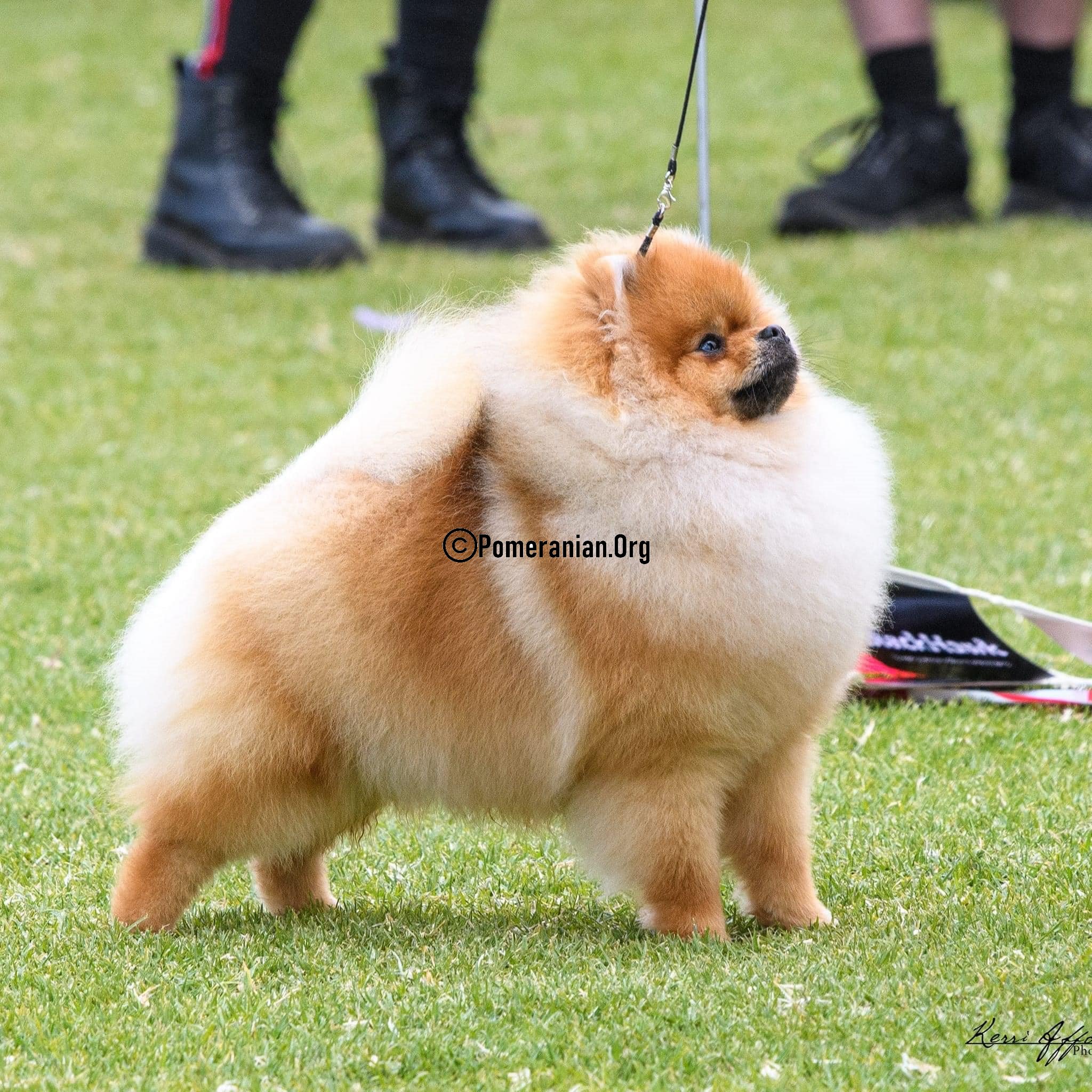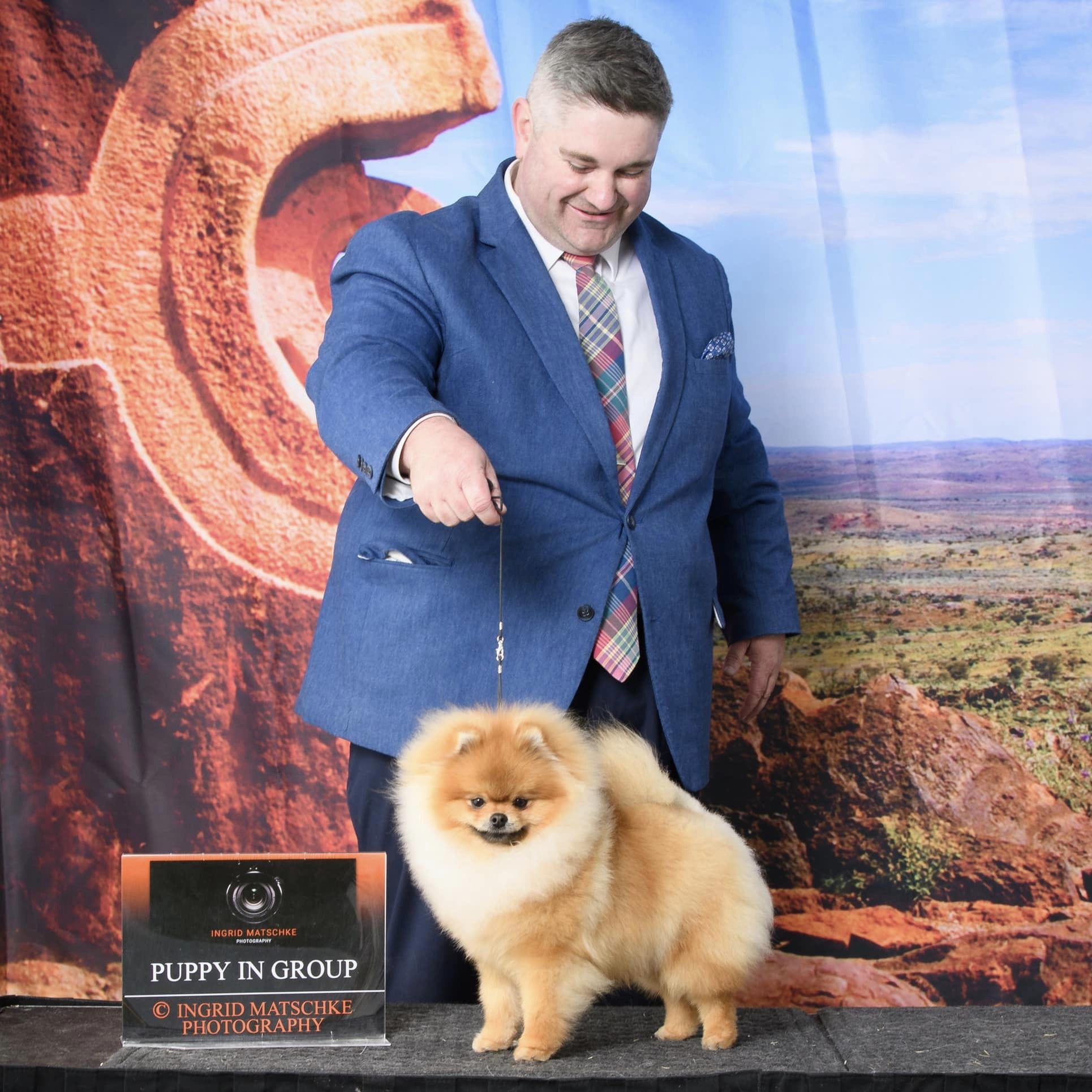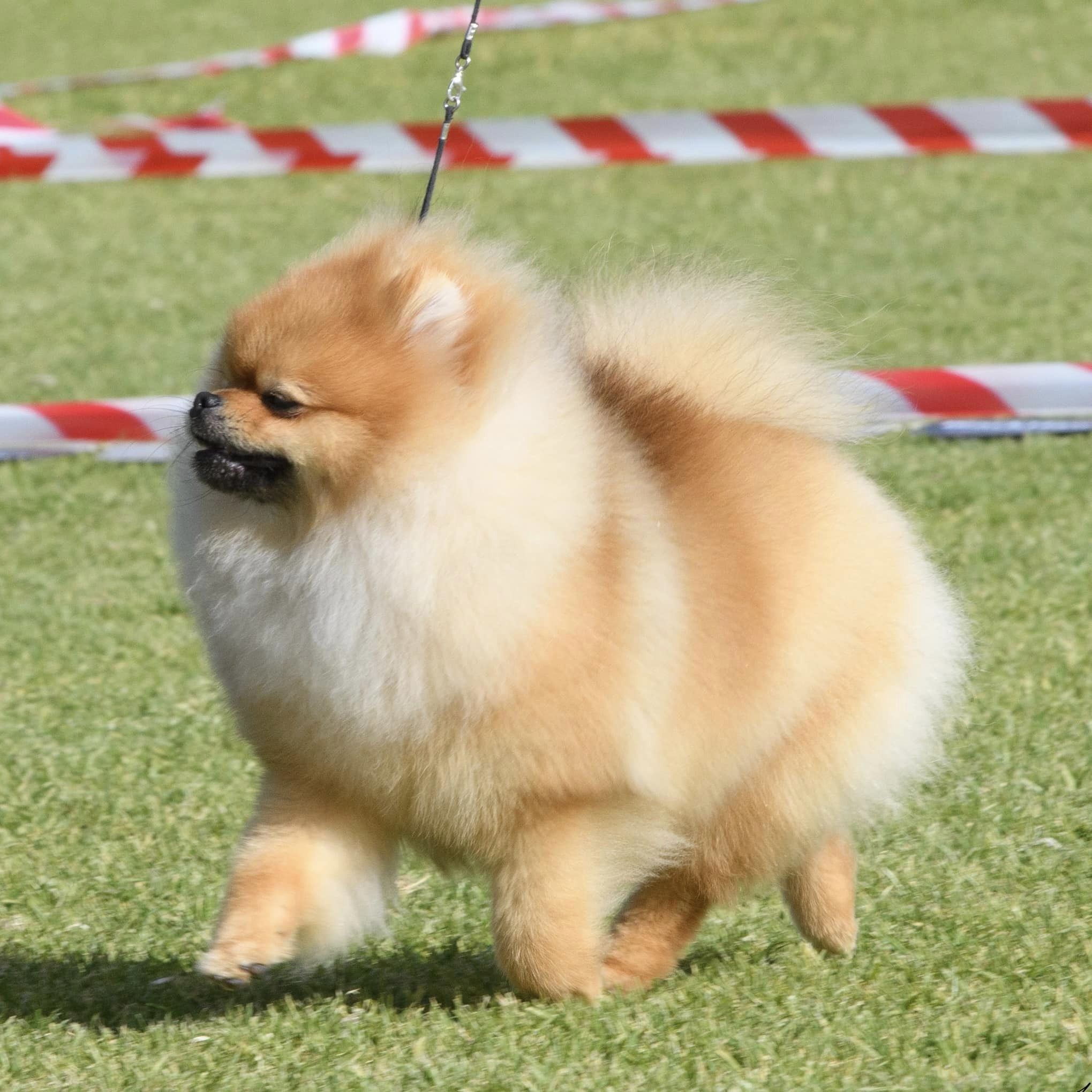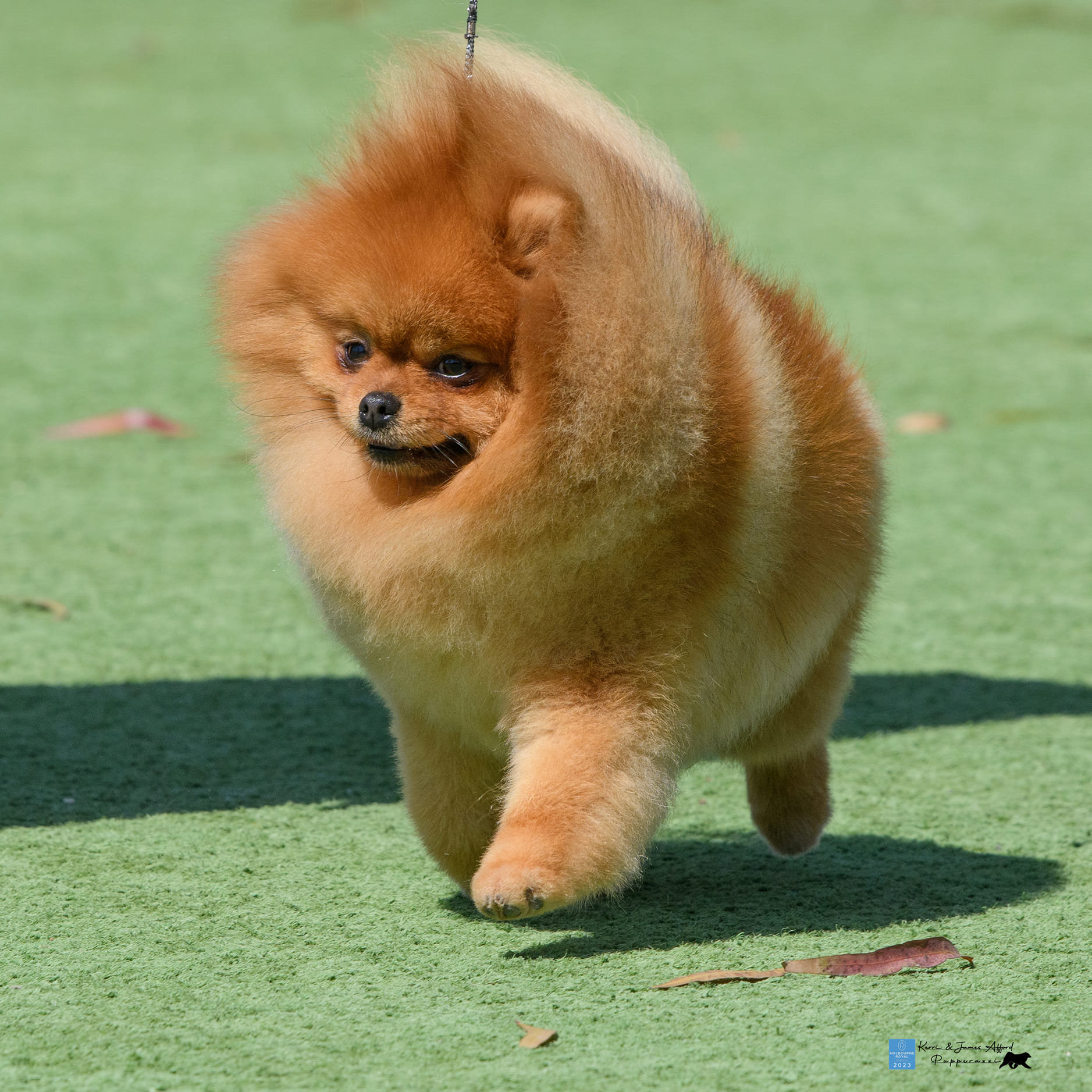Last Updated on 25/04/2024 by Denise Leo. Post first published on February 4, 2023.
Do you want to know how to feed a Pomeranian puppy? As a conscientious Pomeranian puppy owner, you must know the best Pet food and how much a puppy should eat.
This article focuses on food and what your Pomeranian puppy should be fed to ensure the best possible health.
As a Pomeranian breeder with many decades of experience, I’ll examine what foods are good, what nutrients are essential, and why a puppy needs these nutrients.
I will provide a Pomeranian puppy food list and explain the correct puppy feeding amount and Pomeranian puppy dog feeding frequency options in detail.
The Best Food for Pomeranian Puppy Dogs Facts
- Pomeranian puppies should be fed high-quality commercial puppy food containing the correct calcium-to-phosphorus ratio and wet and dry puppy kibble.
- Dairy products such as milk, cheese, and yogurt can also be added to their diet.
- A feeding timetable must be observed depending on the pup’s age; for eight-week-old puppies, this is 1 or 2 heaped tablespoons of canned puppy food 3-4 times daily, plus 24/7 access to dry food.
- Puppies under six months require food available at all times; between 6-12 months, they need canned puppy food twice daily, with dry food still accessible 24/7.
- Avoid feeding red meat or giving them calcium supplements; home cooking is not recommended until after 18 months, while raw feeding is best avoided before this age.
- Fatty acids are essential for muscle strength, heart health, and skin protection from dermatitis – ensure your Pomeranian’s diet has enough fatty acids by reading labels carefully when purchasing pet foods.
- Your Pomeranian requires more calories than an adult dog, so feed him 3 or 4 times per day until he grows older, then reduce it to two meals a day; check his weight regularly for signs of obesity due to calorie intake being too high compared with activity levels achieved each day.
- During teething periods, an increased amount of calcium must be provided through dairy products to maintain a healthy balance between phosphorous and calcium levels – which is necessary for skeletal structure growth & development.
- Various factors such as gender, health status, activity level, and size must all be taken into account when deciding how much and what types of food you feed your pup or adult dog; if transitioning from puppy food proves difficult, try adding small amounts of canned puppy food or fat-free turkey/chicken broth – praise them whenever they eat!
- Home-cooked pet recipes are recommended once your Pomeranian reaches one year old, ensuring he eats various nourishing meals that can be frozen in meal-size portions if necessary.
What to Feed a Pomeranian Puppy
The best Pomeranian puppy food is specially made for a small dog-bred puppy and is of the highest quality.
Foods of this nature need 10% – 25% fat and 22% – 32% protein. Food for adult dogs or low-quality meals prepared for him at home aren’t acceptable.
Learn What to Feed a Pomeranian Puppy
Don’t let this happen to your Pomeranian puppy. Below are photos depicting the result of an incorrect Pomeranian puppy diet.
The photo on the left is this Pomeranian at ten weeks of age. Have a close look at the puppy’s front in this before photo.
The photos on the right depict the same Pomeranian’s front legs after enduring months of a poor diet.
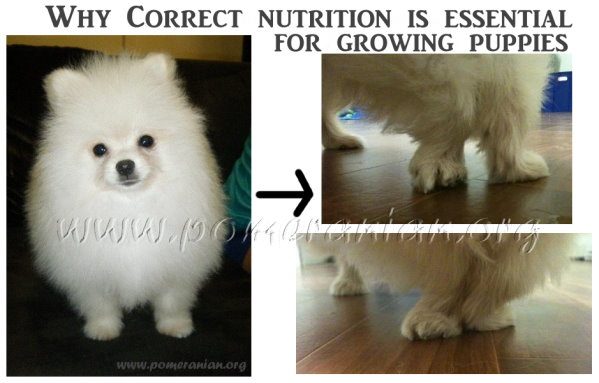
Your Pomeranian Puppy Needs Correct Nutrients to Stay Healthy
If you love animals, you’ll most likely know that nutrients are critical to any dog’s diet, not only a Pomeranian.
Our furry 4-legged friends require a balanced diet of protein, minerals, and vitamins. If this is not fed, your puppy won’t have a strong immune system capable of fighting off diseases.
The choice you make when selecting food for your Pomeranian puppy is critical to good health and happiness. He also needs lots of exercise.
However, most of us easily forget how essential it is to ensure that each meal we give our Pomeranian is chockful of all these vital nutrients.
Pom puppies require far more care than the much bigger breeds. They can’t just eat food, regardless of what it is. Pomeranian puppies must have a planned, nutritious diet to maintain the best possible health.
Your Pomeranian pup should only eat puppy food. There are plenty of different foods, and you should select a wide variety of kibble and wet foods.
It would be best to focus on nutrients such as proteins, fatty acids, and anything that contains many calories. Buying good foods for your Pomeranian puppy must be filled with these nutrients and any extra minerals and vitamins. This is why nutrients are essential and how your puppy benefits.
Best Food for Pomeranian Puppy
I recommend and really like the Royal Canin Pomeranian puppy food brand as the best Pomeranian puppy food:
Royal Canin Pomeranian Puppy Food
- INDOOR SMALL BREED PUPPY FOOD: Royal Canin Small Indoor Puppy Dry Dog Food is tailor-made for puppies from 2 to 10 months old with an expected adult weight of 9-22 lb
- IMMUNE SUPPORT: Clinically proven antioxidants, including vitamins E and C, help support the healthy development of your puppy’s immune system
- PROMOTES OPTIMAL STOOL QUALITY: Helps reduce stool odor and volume with a combination of prebiotics, highly digestible proteins, and a specific fiber blend
- BRAIN DEVELOPMENT: Promotes healthy skin and a healthy dog coat, formulated with DHA, an omega-3 fatty acid that is scientifically proven to help support a puppy’s brain development
- SPECIALIZED KIBBLE: Exclusive kibble for puppies designed for miniature jaws and picky appetites
- Royal Canin Pomeranian Adult dry dog food is designed to meet the nutritional needs of pure breed adult Pomeranians
- Features an exclusive formula enriched with EPA and DHA to support and maintain skin health and a nourished, beautiful healthy coat
- Supports this small breed dog’s fragile knees, joints, and overall bone health
- Delivers a balanced blend of digestible fibers and highly digestible protein to promote digestive health and optimal stool quality
- Provides a smaller kibble shape and size to support the Pomeranian’s smaller jaw while helping to reduce tartar formation, by encouraging the dog to chew
- TOY BREED PUPPY FOOD: Royal Canin X-Small Breed Dry Puppy Food for puppies 2 to 10 months with an expected adult weight of no more than 8 lbs
- CRUNCHY KIBBLE: Crunchy kibble texture is simple to serve and pairs well with Royal Canin X-Small Puppy Thin Slices in Gravy wet food cans
- GROWTH AND DEVELOPMENT: Extra small breed dog food for puppies supports brain development and energy needs during growth and development
- IMMUNE SUPPORT AND DIGESTIVE HEALTH: Antioxidants support the immune system, while prebiotics and proteins promote gut health
- MIXED FEEDING: Give your dog a savory textured meal by mixing in Royal Canin Wet Dog Food for puppies
- FORMULATED FOR SMALL BREED PUPPIES: Royal Canin Canine Health Nutrition Puppy Loaf in Sauce Wet Dog Food is tailor-made for puppies up to 10 months old with an expected adult weight of 4.4-22 lb
- HEALTHY GROWTH: Optimal energy levels support a puppy’s growth and development
- NATURAL DEFENSE SUPPORT: Formulated with a complex of antioxidants to support a developing immune system. Beet pulp, fish oil, and highly digestible proteins support a developing digestive system
- APPETITE STIMULATION: Stimulates a puppy’s appetite with a highly palatable formula that is moderately high in fat and energy density
- COMPLETE AND BALANCED: Wet puppy food can be fed alone as a complete and balanced diet or mixed with Royal Canin Small Puppy Dry Dog Food
- FORMULATED FOR SMALL BREED PUPPIES: Royal Canin Small Breed Puppy Wet Dog Food is formulated for puppies from 2 to 10 months old with an expected adult weight of up to 22 lb
- SOFT TEXTURE: Tasty chunks in gravy and the soft food texture make it easy for growing small breed puppies to eat
- IMMUNE SUPPORT: Clinically proven antioxidants, including vitamins E and C, help support the healthy development of your puppy’s immune system
- MICROBIOME SUPPORT: Prebiotics and highly digestible proteins help promote a balance of intestinal bacteria for digestive health and optimal stool quality
- BRAIN DEVELOPMENT: This wet puppy food is enriched with DHA, an omega-3 fatty acid, scientifically proven to help support your puppy’s brain development
- FORMULATED FOR SMALL BREED PUPPIES: Royal Canin Small Puppy Dog Food is tailor-made for puppies from 2 to 10 months old with an expected adult weight of 4.4-22 lb
- IMMUNE SUPPORT: Clinically proven antioxidants, including vitamins E and C, help support the healthy development of your puppy’s immune system
- MEETS HIGH ENERGY NEEDS: Kibble is tailored for small jaws and picky eaters, and meets the high energy needs of small breed dogs during their short growth period
- BRAIN DEVELOPMENT: Enriched with DHA, an omega-3 fatty acid that is scientifically proven to help support a puppy’s brain development
- MICROBIOME SUPPORT: A combination of prebiotics and highly digestible proteins helps promote a healthy balance of intestinal bacteria and optimal stool quality
- FORMULATED FOR PUREBRED POODLES: Royal Canin Poodle Puppy Dry Dog Food is designed to meet the nutritional needs of purebred Poodles 8 weeks to 10 months old
- SPECIALIZED KIBBLE: Unique kibble design helps Poodles easily pick up and chew their food
- HEALTHY DEVELOPMENT: An exclusive complex of antioxidants, including vitamin E, helps support puppy development of the immune system
- SKIN AND COAT: EPA and DHA from fish oil promote healthy skin and coat to help nourish puppy’s developing curly coat
- OPTIMAL STOOL: Supports healthy digestion in puppies and promotes optimal stool quality with high-quality proteins and prebiotics
- Royal Canin Chihuahua Puppy dry dog food is designed to meet the nutritional needs of growing purebred Chihuahuas 8 weeks to 8 months old
- Exclusive tailor-made kibble helps Chihuahua puppies easily pick up and chew their food
- Helps protect puppy’s developing immune system and natural defenses with an exclusive complex of antioxidants including vitamin E
- Helps reduce stool odor with highly digestible proteins and precise fiber content
- High palatability with exceptional aromas and flavors to satisfy picky appetites
- FORMULATED FOR EXTRA-SMALL BREED PUPPIES: Royal Canin X-Small Puppy Dog Food is tailor-made for puppies from 2 to 10 months old with an expected adult weight of no more than 8.8 lb
- HEALTHY ENERGY: Meets the high energy needs of extra-small puppies with key nutrients needed during their short, intense growth period
- IMMUNE SUPPORT: Clinically proven antioxidants, including vitamins E and C, help support the healthy development of your puppy’s immune system
- BRAIN DEVELOPMENT: Enriched with DHA, an omega-3 fatty acid that is scientifically proven to help support a puppy’s brain development
- MICROBIOME SUPPORT: A combination of prebiotics and highly digestible proteins helps promote a healthy balance of intestinal bacteria and optimal stool quality
- FORMULATED FOR MEDIUM BREED PUPPIES: Royal Canin Medium Puppy Dog Food is tailor-made for puppies from 2 months to 1 year old with an expected adult weight of 23-55 lb
- MEETS HIGH ENERGY NEEDS: Tailored to meet the high energy needs of medium breed dogs during their short growth period
- IMMUNE SUPPORT: Clinically proven antioxidants, including vitamins E and C, help support the development of your puppy’s healthy immune system
- BRAIN DEVELOPMENT: This dry puppy food is enriched with DHA, an omega-3 fatty acid scientifically proven to help support your puppy’s brain development
- MICROBIOME SUPPORT: The combination of prebiotics and highly digestible proteins helps promote a healthy balance of intestinal bacteria for digestive health and optimal stool quality
What do Pomeranian Puppies eat?
The best food for Pomeranian puppies is a high-quality commercial puppy because most adult dog food and home-cooked doggie meals won’t contain the correct calcium-to-phosphorus ratio.
- A high-quality wet puppy food.
- High-quality dry puppy food (often called puppy kibble). A Pomeranian puppy is the best fed dry food that comes in very small pieces.
- Daily feed your puppy dairy products, such as puppy milk, yogurt, and cheese.
- Minced raw chicken carcass. (This is the minced chicken that contains small ground-up chicken bones.)
Pomeranian Puppy Feeding Timetable
How often should my Pomeranian puppy eat? How frequently you must feed your Pomeranian puppy is dependent upon their age.
Pomeranian puppies under six months must have food accessible at all times.
Pomeranians over six months still require puppy food until 12 months. From 6 to 12 months, Pomeranian pups need canned puppy food to be offered twice daily, with dry food still available 24/7.
How often to feed Pomeranian puppies eight weeks old:
- Premium-quality, dry puppy food should be available at all times.
- Water must be open at all times.
- Canned puppy food, minced raw chicken carcasses, and puppy milk (or cheese or yogurt) are offered to the puppy three to four times per day.
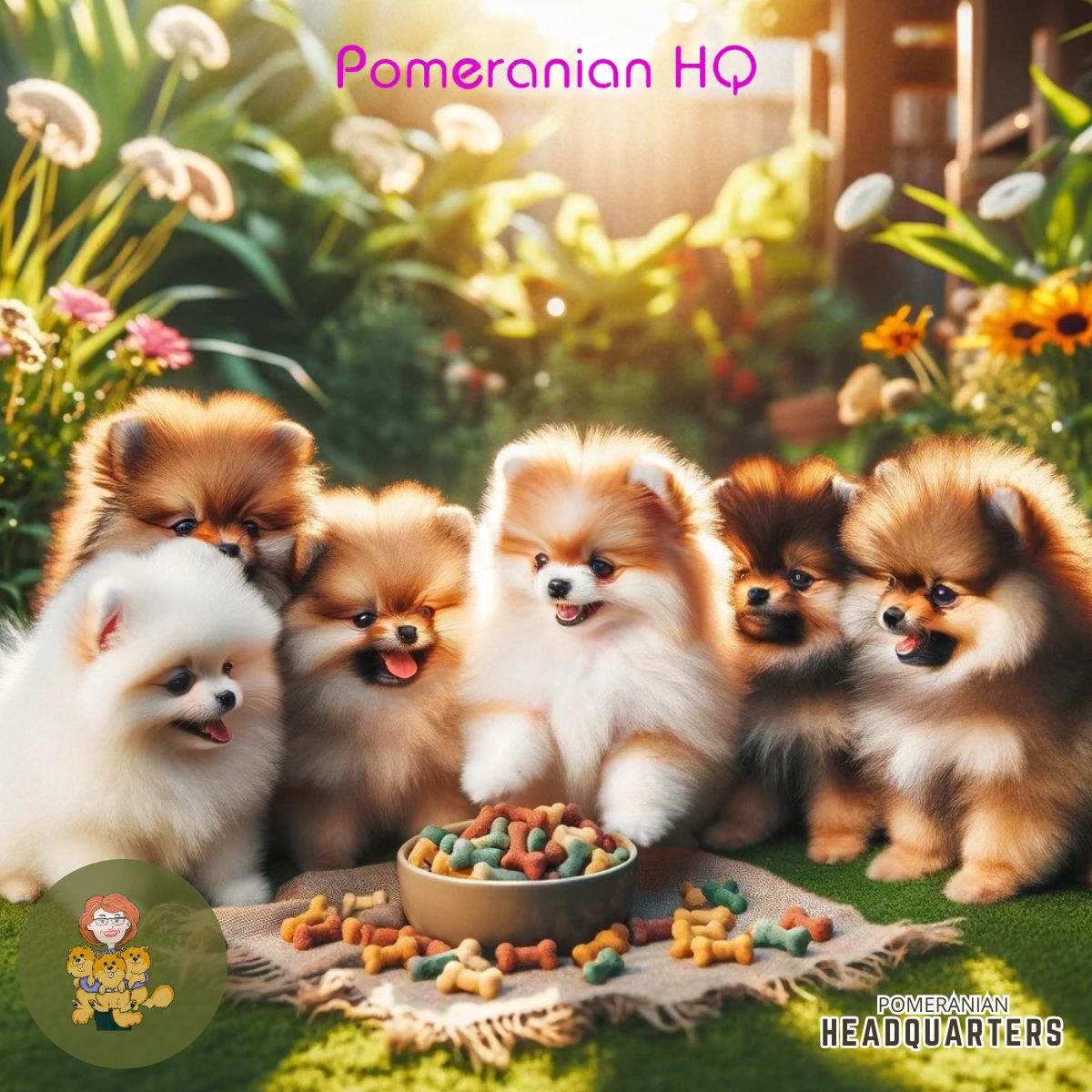
How Much Should You Feed a Pomeranian Puppy?
How much to feed a Pomeranian puppy? Are you unsure of the correct Pomeranian puppy feeding quantity?
At Dochlaggie Pomeranians 8 week old Pomeranian puppies are offered the following as per my Pomeranian puppy feeding chart:
Exactly What to Feed a Pomeranian Puppy Diet Chart
Pomeranian puppy food list:
- 1 or 2 heaped tablespoons of canned puppy food with a little cheese or puppy milk on top, three or four times daily. Meals are made more palatable in winter if warmed before serving.
- 1 or 2 heaped tablespoons of puppy kibble or dry food in a small shallow dish should be available 24/7.
Increase these amounts a little each month until the puppy is about six months old. This puppy feeding quantity is just a guide, as puppies are individuals. A very active or bigger pup will require more food.
Use common sense. If the puppy is hungry and isn’t fat, increase the amount of Pomeranian puppy food you feed him.
Important Pomeranian Puppy Diet Facts
- Avoid feeding any puppy red meat.
- Avoid giving puppy calcium supplements.
- Increase the amount of calcium in the pup’s diet safely by feeding more dairy.
- Don’t feed your puppy adult dog food.
- Home cooking for puppies is not recommended.
- Raw feeding is best not introduced until after 18 months of age.
Can Puppies Eat Adult Dog Food?
Correct nutrition is essential for a pup’s development. Feeding an adult dog puppy food can have dire consequences. A quality puppy diet is essential for the long-term health of your Pomeranian puppy.
Pomeranian Puppies Often Require Increased Calcium While Teething
Signs of calcium deficiency include:
- One or both ears are standing awkwardly or flopping over.
- The tail is standing upwards instead of flat on the pup’s back.
Signs of extreme calcium deficiency include:
- Spreading toes.
- Flat pasterns and east-west fronts.
- Limping or even refusing to walk on one back leg on the odd occasion. Avoid patella surgery on Pomeranian pups under 12 months. During the teething period, increase the amount of calcium in your pup’s diet by increasing the amount of dairy.
Importance of the Correct Phosphorous and Calcium Ratio
Phosphorous and calcium work together well to maintain the structure and growth of your dog’s skeletal system. If your Pom is deficient or has too much of either mineral, problems with the skeleton can occur. This is especially true in young puppies.
In the long term, it’s critical to good health to feed your Pomeranian the correct ratio of these two minerals. Issues with these minerals generally don’t exist nowadays because buying commercial pet food with a healthy balance of both substances is easy.
Problems of this nature usually occur if you feed your Pom an excessive amount of these minerals or make a diet that isn’t properly balanced. Young, rapidly growing puppies face this problem more often than older dogs.
Calcium Deficiency
The correct ratio of phosphorous to calcium is vital. A calcium deficiency used to be fairly normal.
The cause was mainly due to feeding your dog diets high in meats and organ meats low in calcium and phosphorous.
If the dogs weren’t fed calcium supplements, they would often develop rickets (a skeletal abnormality) and many other ailments.
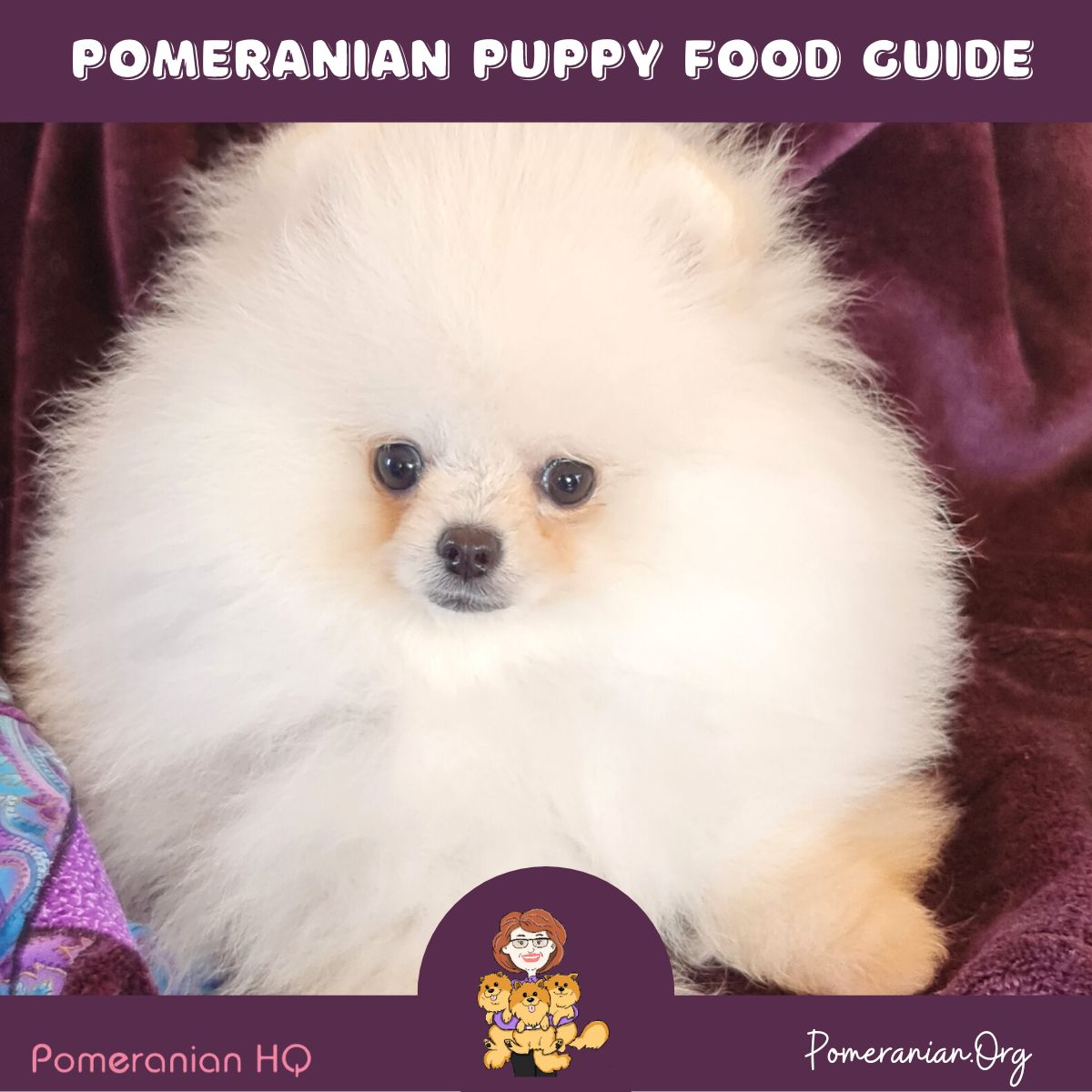
Fatty Acids Help Protect Puppy Against Dermatitis
Fatty acids are high on the list of nutrients to feed your Pomeranian. However, they’re also lacking in a lot of animal diets.
Dog owners like you must ensure your puppy’s diet is rich in fatty acids. These nutrients are essential for muscle strength, heart health, a healthy reproductive system, and more.
There is one essential reason why fatty acids are a critical part of your furry friend’s good health, and that is his skin.
Pomeranians are extremely prone to dermatitis, which dries the skin and makes it itch. Fatty acids can protect your Pomeranian’s skin and ensure it’s healthy.
The reason why they succeed is their nutritional value. They possess exceptional antioxidant properties and act as mediators for numerous physiologic processes in their bodies. They reduce inflammation, help clot the blood, and smooth the digestive tract.
Most important body functions can be adverse without sufficient fatty acids, so it must be avoided at all costs.
A deficiency can cause digestive issues, skin problems, eye disease, allergies, heart troubles, and many more, so your puppy must have a healthy diet.
Not all foods for puppies contain identical amounts of fatty acids; food that’s high in quality does contain a larger quantity. Always read food labels to check if a food has the right amount of nutrients necessary for your Pom.
Your Pomeranian Puppy Requires More Calories Than an Adult Dog
Pomeranians are very energetic animals. He can consume more calories quicker than other dogs, meaning you must constantly replenish his energy. I recommend feeding your Pomeranian puppy 3 or 4 times each day. When he’s older, reduce it to twice daily.
You need to alter the portion sizes of his food as he ages. You don’t want him to be fat and risk contracting diabetes. You aim to keep him at a healthy, wealthy weight and ensure his metabolism functions well.
A fit, healthy puppy won’t have thick fat between the bones. As he grows, his weight will start to fluctuate. It will even out around his body, and all fat and weight will be distributed evenly. Feed him more calories to assist in achieving a healthy weight.
Pomeranian Protein Requirements
Start by talking to your vet. It’s common for adult food to have less protein than puppy food.
Protein Helps Prevent Puppy Having Dental Troubles
Pomeranians are usually healthy dogs with the right diet and enough exercise. However, they have a major weakness compared to bigger breeds.
Protein is essential to your puppy’s diet and helps in many ways. It’s a great energy source, repairs the body and muscles, and strengthens the immune system to tackle diseases and stubborn infections.
Your Pomeranian can only get protein from his food. If you don’t feed him enough proteins, his body may be unable to create essential hormones and enzymes critical to your dog’s continued health.
One specific reason protein is critical to the health of your Pom is his dental health. Pomeranians have small mouths and are more prone to dental problems such as tooth decay, tooth pain, crowded teeth, gum infections, and more.
Without the right protein level, his teeth are at a higher risk of exposure to these dental issues.
Trouble begins with a build-up of tartar. Then comes an infection that can cause problems in the gums and roots of his teeth. If these problems aren’t treated, tooth decay can occur.
This causes much pain for any puppy, not only a Pomeranian. This is why you must feed your little furball a high-protein diet.
The ideal method for learning if your puppy isn’t getting enough protein is to check for symptoms of weakness, unexplained weight loss, or a rough/dull coat.
If you suspect he has dental problems or a protein deficit, take him to the vet for a check.
Changing Puppy Food to Adult Dog Food
How Long to Feed Puppy Food?
After 12 months of age, I firmly believe healthy, home-cooked meals are best for your Pomeranian. Pomeranian pups go through many changes during their first year. I recommend feeding some high-quality puppy food until your Pom’s first birthday for correct growth and bone development.
Around the 52-week mark, Pomeranians should be fed a diet more suited to a dog who is now an adult Pom. Adult dog food is filled with the correct balance of vitamins and nutrients for adult dogs.
One reason for the change is that adult dogs require less food and calories than growing puppies. The minerals and vitamins needed by adult dogs differ as well.
It’s wise to make the transition slowly so that he only has adult dog food by the time he’s 52 weeks old. If you don’t complete the changeover by now, there may be some consequences.
One is that the puppy’s metabolism slows, so the additional calories he’s consuming aren’t being burnt off, and a result could be a little tubby Pom.
The best way to make the change go smoothly is to replace ¼ cup of puppy food with dog food. Increase by a further ¼ every few days until the whole amount is replaced. If your puppy has an upset stomach, reduce the adult food and then make the change much slower.
Home Cooking Pet Food-Pomeranian Food Recipes
At around the one-year mark, I recommend changing your Pomeranian’s diet from commercial puppy dog food to a home-cooked dog food diet.
Seriously, consider home cooking for your Pomeranian. Home-cooked dog food is number one on my best Pomeranian dog food list.
Home cooking will ensure your Pom eats various nourishing and healthy foods. Pet food can be cooked in advance and frozen for later use in meal-size portions.
Refer to Home Cooking for your Pomeranian section for the best Pomeranian food recipes.
Pomeranian Vitamins and Supplements
If you give your puppy (under 52 weeks) extra minerals and Pomeranian vitamins, these supplements may cause health issues. Once the puppy is over that mark, supplements are usually fine added to your adult dog food.
Talk to your vet about any supplements that may be required. Most high-quality commercially produced dog food does not require supplementation.
Adult Pomeranian Feeding Schedule
Changing your Pomeranian dog’s feeding regime is important once he turns one year old. Failing to reduce the number of times your Pomeranian is fed daily can result in an overweight Pomeranian.
As the puppy ages, he can eat twice a day instead of the three to four times he ate when he was younger. If stomach upsets occur, revert back to thrice daily for a short time.
- Formulated high in protein to meet the needs of highly active toy breed dogs
- High protein formula, with real chicken as the first ingredient
- Fortified with guaranteed live probiotics for digestive and immune health
- Used to be known as FOCUS Chicken and Rice Formula
- DHA from omega-rich fish oil nourishes brain and vision development
- Fresh new look, coming soon
- This dry puppy food uses DHA from fish oil to support healthy brain & eye development
- Provides your small breed dog with high quality protein for building lean muscle
- Uses a balance of minerals to promote strong bones and healthy teeth
- Uses an antioxidant blend specifically for lifelong immune support in toy and miniature dogs
- REAL MEAT FIRST: Chicken is the #1 ingredient in this high-protein Blue Buffalo puppy food
- ESSENTIAL NUTRITION FOR PUPPIES: This puppy dog food supports cognitive development with DHA, and it provides energy for growth and play
- IMMUNE SYSTEM SUPPORT: High protein dry dog food that contains exclusive, antioxidant-rich LifeSource Bits
- HEALTHY, WHOLESOME INGREDIENTS: This Blue Buffalo dog food is made with no chicken (or poultry) by-product meals and no corn, wheat, or soy
- Contains: One (1) 4-lb. bag of Baby BLUE Healthy Growth Small Breed Puppy Dry Dog Food, Chicken and Oatmeal Recipe
- TOY BREED PUPPY FOOD: Royal Canin X-Small Breed Dry Puppy Food for puppies 2 to 10 months with an expected adult weight of no more than 8 lbs
- CRUNCHY KIBBLE: Crunchy kibble texture is simple to serve and pairs well with Royal Canin X-Small Puppy Thin Slices in Gravy wet food cans
- GROWTH AND DEVELOPMENT: Extra small breed dog food for puppies supports brain development and energy needs during growth and development
- IMMUNE SUPPORT AND DIGESTIVE HEALTH: Antioxidants support the immune system, while prebiotics and proteins promote gut health
- MIXED FEEDING: Give your dog a savory textured meal by mixing in Royal Canin Wet Dog Food for puppies
- 【Size】: L9.44″ * W9.44″* H1.14″ suitable for cats, puppies and small dogs.
- 【Interactive Dog Toys】This is a fun interactive puppy puzzle toy, which can easily become the closest companion and toy for your puppies and cats, and will release pressure for dogs. Find food by sliding parts to improve eating pleasure and IQ.
- 【Slow feeder】This slow feeder encourages pets to eat at a slower speed, helps to slow down the feeding time to help the dog digest, and can provide your dog with a variety of healthy snacks.
- 【Slow Feede toys】 Use this educational game toy to exercise the dog’s brain, which will help meet the dog’s instinct needs, train the pet’s sense of smell, and let the dog enjoy fun feeding when using the nose or paw to move the slider, while providing spirit stimulate.
- 【Dog toys】No toy is indestructible. Do not leave toys with unsupervised pets. Remove and replace toy if damaged.
- 🐶RUBBER MATERIAL: HIPPIH treat dispensing dog ball is made of extra-tough rubber with good elasticity, good for your sweet dog grinding and fresh their teeth. ( Blue color-2.75 in, Green color-3.14 in, suitable for small and medium large dogs.)
- 🐶STRONG TOOTH: HIPPIH blue dog ball can effectively help strong their teeth and won’t hurt pets gums. The green one can put the food in to improve the interest of your cute dogs.
- 🐶IMPROVE INTELLIGENCE & IQ TRAINING: HIPPIH dog toy ball can easily attract your pet’s attention, help pets intelligence improving and is convenient to train dogs. HIPPIH dog ball toys are perfect for interaction with your dog, promoting the bond between you and your dog.
- 🐶FOR AMUSEMENT: Perfect for fetch and interaction with your dog. You can add food or treats into the grooves and this keeps your dog entertained and active. HIPPIH IQ treat ball allow you have more interactive fun with your pets.
- 🎁BEST GIFT FOR PETS: HIPPIH dog toys ball can reduce the dog’s destructive behavior, protect the home shoes, socks, sheets, sofa are not afraid of dog bite. Your naughty active dogs will be love it to kill the boring time. This dog rubber ball is best gift for your sweet dog.
- GRAIN-FREE SMALL BREED DRY PUPPY FOOD: Premium protein from responsibly sourced turkey is expertly balanced with nutrient rich superfoods for a complete and balanced meal, with guaranteed levels of nutrients your puppy needs to thrive.
- SUPPORTS HEALTHY BONE GROWTH AND BRAIN DEVELOPMENT: Guaranteed levels of DHA supports brain development, antioxidants support strong immune systems, probiotics for digestive health and calcium and phosphorus support healthy bone and muscle development.
- LEANER BODY MASS AND MUSCLE TONE: Based on the nutritional philosophy that dogs thrive on a natural diet mainly comprised of meat, this dry puppy food is made with 53% high quality protein ingredients.
- NO CORN, WHEAT, OR SOY: Contains only premium, all natural ingredients with no poultry by-products, wheat, wheat gluten, corn, soy, artificial colors, or preservatives. Manufactured in a facility that also processes grains.
- MADE IN USA: Using only the finest globally sourced ingredients, we prepare each of our diets in our own state of the art facility; recipes crafted with wholesome, non-GMO ingredients chosen for their nutritional benefits.
- Adjustable treat dispensing toy
- Large chamber fits whole meals
- Weighted bottom wobbles. New adjustment gate on the bottom accommodates a larger kibble size and is easier to adjust
- The Package Width Of The Product Is 5.4 Inches
- [Pet toy with food distribution function]Innovative design, with American local appearance patent. The toy has both entertainment and food distribution functions, providing more joy for dogs during play. The food distribution feature helps dogs develop a slow-eating habit, maintaining their digestive health. Dogs can get food rewards during play, engaging both their brains and bodies, enhancing their intelligence and brain development.
- [Food distribution function]The toy has differently sized spheres at both ends. As dogs push the toy, it moves within a fixed area, allowing dogs to continuously chase and play with it. During movement, food is dispensed from the food holes on both sides of the toy.
- [Adjustable food dispensing function] Each of the two spheres with a food dispensing switch, making it suitable for various sizes and types of pet dry food, jerky, or snack biscuits. The switch can be adjusted according to the different sizes of dog food. It also allows control over the amount of food dispensed, extending or shortening the time it takes for pets to obtain food.
- [Puzzle toy function]Dogs can smell the food through the dispensing holes. They can use their noses or paws to move the toy, and as the toy rolls, food is dispensed, and pet get food reward. This process helps train intelligence, expend excess energy, stimulate the mind, provide mental enrichment, and engage bored dogs in physical activity.
- [Safe Material and Design] The product’s raw materials do not contain any bisphenol A, PVC, or phthalates. It is made of food-grade ABS, ensuring the complete protection of your dog’s health. You can confidently let your dog use it. The product is sturdy and enduring, resistant to damage by pets.
- XS Puppies (Up to 5 lbs): This KONG Puppy toy is 1.5″ by 2.25″; made of a soft rubber formula for a growing puppy’s baby teeth and gums – WHEN YOUR PUPPY TURN 9 MONTHS, SWITCH TO KONG CLASSIC OR KONG EXTREME
- Fetch and Chew Toy: The KONG Puppy’s bounce makes for games of fetch & is an ideal chew toy for the puppy’s teeth and gums
- Stuffing: The stuffable KONG Puppy is more enticing when filled with KONG Puppy Easy Treat and KONG Snacks. For an added challenge, freeze stuffed KONG for 4-6 hours before giving to your dog. (Dishwasher safe for easy clean up)
- Vet Recommended: Veterinarians and trainers worldwide recommend the KONG Puppy as one of the best durable puppy toys available
- Made in the USA. Globally Sourced Materials
How Much to Feed an Adult Pomeranian Dog
Ensure you understand how much food is the recommended daily allowance when you change to adult dog food. Generally, it will be less than fed to a Pom puppy. Again, talk to your vet or breeder about the number of calories most adult Pomeranians require.
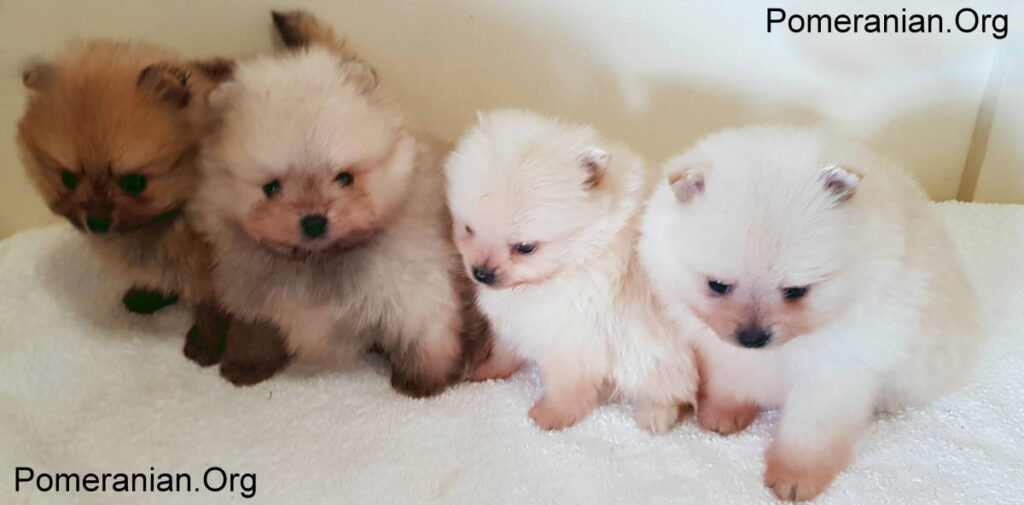
Pomeranian Puppy Diet Final Thoughts
Many factors govern how much and what food you feed your Pomeranian, regardless of whether he’s a puppy or an adult.
Other elements include gender, health, activity level, and dog size. One serious problem that must be avoided is obesity.
When you change Pomeranian puppy food to adult food, you may have to try things to see what works best. If your puppy doesn’t like adult dog food, add a small amount of canned puppy food, fat-free turkey, or chicken broth.
Praise your puppy when he eats the new food combinations, and if nothing you try makes him eat, you can pretend to eat it yourself to show him that it’s delicious.
Copyright Pomeranian.org. All Rights Reserved.
References and Further Reading:
[1] Denise Leo “The Pomeranian Handbook”.
Pomeranian Grooming eBook
